| Yugoslavia at the Olympics | |
|---|---|
 | |
| IOC code | YUG |
| NOC | Yugoslav Olympic Committee |
| Medals Ranked 42nd |
|
| Summer appearances | |
| Winter appearances | |
| Other related appearances | |
Teams from Yugoslavia first participated at the Olympic Games in 1920. Previously, several athletes from Croatia, Slovenia and northern Serbian province Vojvodina had competed for Austria or Hungary when those countries were part of the Empire of Austria-Hungary. A small team of two athletes had competed distinctly for Serbia at the 1912 Summer Olympics.
Contents
- Timeline of participation
- Hosted Games
- Medal tables
- Medals by Summer Games
- Medals by Winter Games
- Medals by summer sport
- Medals by winter sport
- List of medalists
- Summer Olympics
- Winter Olympics
- Medal table after Yugoslavia
- See also
- References
- External links
Yugoslavia has been the designation for Olympic teams from three distinct national entities:
- Kingdom of Yugoslavia (officially called the Kingdom of Serbs, Croats and Slovenes until 1929) from 1920 to 1936
- Socialist Federal Republic of Yugoslavia from 1948 to the 1992 Winter Olympics
- Federal Republic of Yugoslavia, formed as a joint state by only Montenegro and Serbia after the breakup of Yugoslavia, from 1992 to 2002 (due to UN ban allowed to compete as Independent Olympic Participants at the 1992 Summer Olympics and was not allowed to compete at 1994 Winter Olympics)
Two of the successor nations (Croatia and Slovenia) began to compete as independent teams at the Olympics starting at the 1992 Winter Games and Bosnia and Herzegovina at the 1992 Summer Games and as of the 2008 Summer Olympics, all six successor nations, former socialist republics, have participated independently. Kosovo, a former autonomous province, made its Olympic debut as an independent national team at the 2016 Summer Olympics.